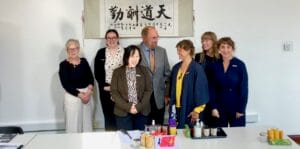Clinical Training
How the Clinical Training is organised
In the third year Clinical students (Clinical Trainees), who have successfully completed all academic and practical examinations, transfer from the College to the Teaching Clinic. Under the supervision of an experienced Clinical Supervisor and under the direction of the Clinical Director, with first-hand knowledge of working in top hospitals and universities in China, students will undertake their clinical training.

Clinical Trainees and Clinical Staff
Clinical Trainees provide their own clients for the Teaching Clinic from the geographical area in which they intend to set up their own TCM Clinic. This means that when the Trainees become qualified practitioners they have already established a client base and are able to go straight into Clinical practice. This is a system that works very well and quickly encourages the Trainee to gain the necessary client management skills.
During the Clinical Training period all treatments are carried out in the Teaching Clinic adjoining the main college premises, in Dublin 3, under the supervision of a trained Clinical Supervisor. Trainees are NOT allowed to treat without supervision.
The Clinical Year begins in September each year and a requisite number of treatments have to be successfully conducted in the Teaching Clinic during the first 6 months.
After this, provided all the Clinical competences have been met, the Trainee can become an insured practitioner of Acupuncture TCM within about 2 and a half years of first starting the Licentiate programme. The graduates usually set up in practice in their home areas straight away.
Clinical Training Syllabus – Practical Clinical Skills
- Location and needling of Acupuncture points – practical
- Taking a case history
- Applying the Diagnostic methods – the four Examinations
- Practical Pulse diagnosis
- Practical Tongue diagnosis
- Practical Looking diagnosis
- Practical Listening diagnosis
- Determining the Causes of disharmony and disease
- Differentiating the Patterns of Disharmony
- Selecting the appropriate Methods of treatment
- Applying the Principles of therapeutics
- Acupuncture
- Moxibustion
- Cupping
- Dietary Therapy
- Applying the Principles and priorities of Treatment
- Acupuncture Point selection according to the Classification and action of Points
- Working according to Clinical safety requirements
- Needling technique and sterile procedures
- Treatment techniques
- Patient management
- Interpersonal and Communication Skills
- Clinical Management
- The treatment of common diseases – Aetiology and Pathology of Disease
Practical implementation of Theory including:
- The treatment of common diseases – with reference to Western pathology and Disease differentiation including infectious diseases, pain management, respiratory diseases, Headache, Rheumatism and Arthritis, Digestive diseases, cardio-vascular disorders, skin disease, back pain, emotional and mental disorders, childhood disorders, gynaecological disorders, infertility, urogenital disorders, eating and dietary irregularities, congenital and acquired deficiencies.
- Introduction to Western Pharmacology – drug side effects and withdrawal
- The procedures and ethics of referral
- Professional Ethics and Codes of Practice
- Consultation and liaison procedures.
Clinical procedures and protocols
During their Clinical training in the ICTCM Teaching Clinic students will:
- Undertake the diagnosis and supervised treatment of a required number of patients
- Observe and record the diagnosis and treatment of patients of other Clinical students and practitioners
- Prepare detailed case histories and treatment schedules and maintain comprehensive treatment records of all patients treated and observed
- Submit all case histories and treatment schedules to a Clinical Supervisor for approval
- Consult with a Clinical Supervisor on all treatment procedures
- Accumulate a collection of practical case histories and treatment plans
- Develop patient education programmes
- Improve patient management and Clinical practice skills
- Gain first-hand experience and expertise in practical Clinical procedures and day to day practice management
- Practise and perfect therapeutic procedures in a supervised Clinical setting
- Expand and document theoretical knowledge of disease categories, types and differentiations
- Receive instruction in the practicalities of establishing their own TCM surgeries and Clinics
- Receive instruction on the prerequisites of business management in the caring profession
- Receive instruction on how to establish links with other healthcare professionals, orthodox, complementary and alternative
Apply for this course now or go to the next page to see the Syllabus of the Western Medicine Module
